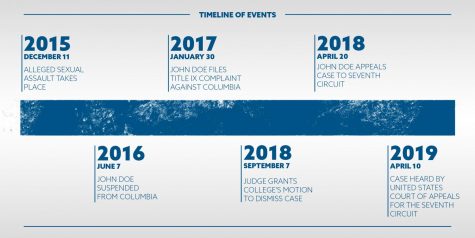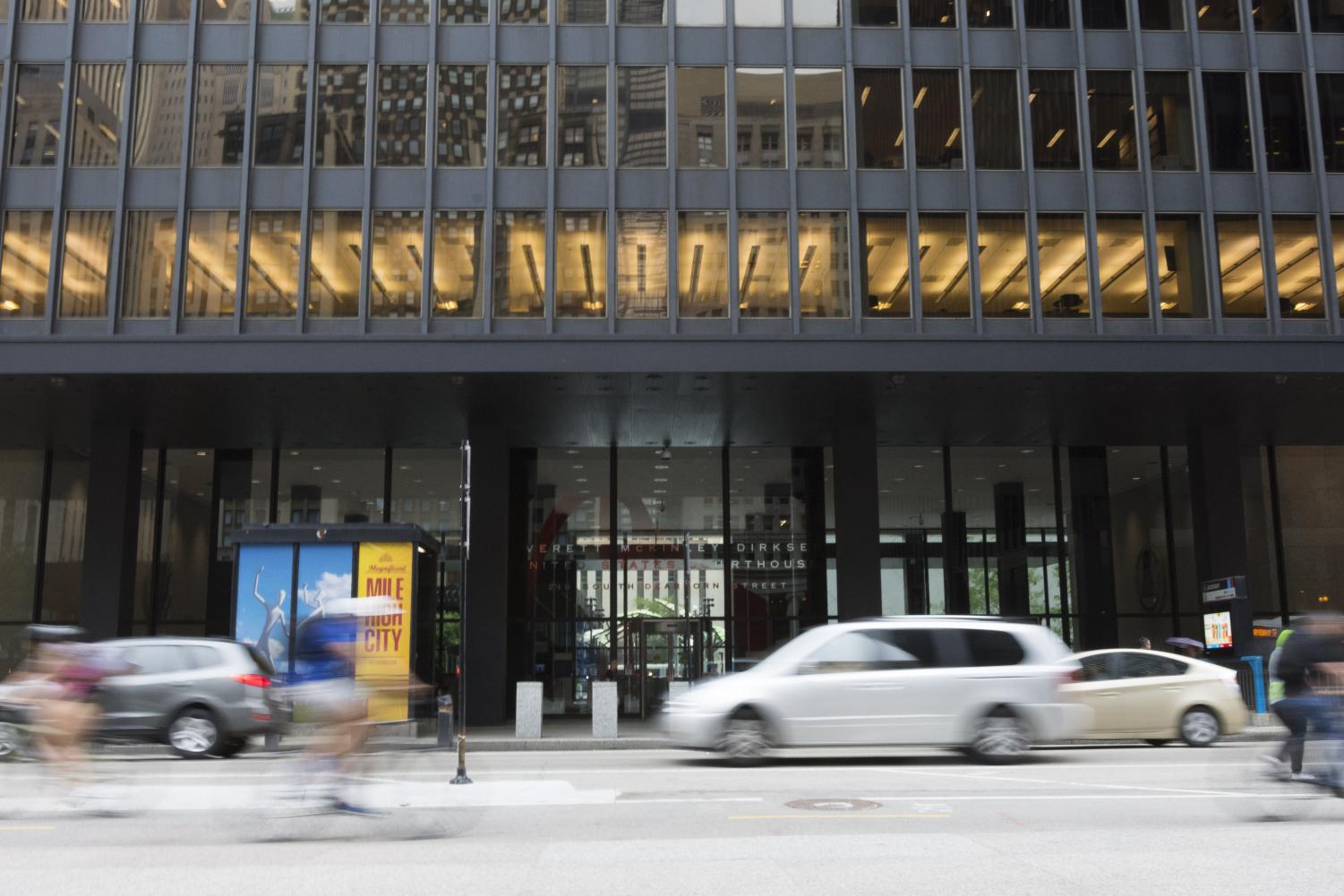Title IX policies have ‘anti-male bias’ and treat students accused of sexual assault unfairly, lawsuit alleges
July 23, 2019
As the #MeToo movement empowers people to speak up about their sexual assault experiences, colleges across the nation are facing lawsuits from students accused in rape and sexual harassment cases. Now, some of the accused are claiming colleges are not equipped to handle sexual assault investigations in an unbiased fashion. Columbia is currently facing one of those lawsuits.
In a Title IX lawsuit appeal heard April 20 by the United States Court of Appeals for the Seventh Circuit, a former Columbia student under the pseudonym John Doe alleges the college fosters an “anti-male bias” which discriminates against male students accused of sexual assault. The suit alleges Columbia is “anti-male,” because it does not permit male students accused of sexual assault to have the same rights under Title IX policies that female student victims have, which Doe said is a direct repercussion from a “Dear Colleague” letter.
The 2011 “Dear Colleague” letter was written under the Obama Administration. The memorandum “explains that the requirements of Title IX pertaining to sexual harassment also cover sexual violence, and lays out the specific Title IX requirements applicable to sexual violence,” according to the letter.
As universities responded to the “Dear Colleague” letter by altering policies to eliminate hearings and cross-examinations of alleged victims, more accused students—who were typically male—began to sue because of the harsh penalties and alleged lax investigations at their schools. According to Brooklyn College History Professor KC Johnson, this meant that more Title IX “horror shows of universities botching these investigations” popped up in court, causing judges to both challenge and become more aggressive toward stringent college policies.
Johnson, who has followed many Title IX cases throughout the years, is the co-author of “Until Proven Innocent: Political Correctness and the Shameful Injustices of the Duke Lacrosse Rape Case.” The book chronicles the 2006 case of three white male lacrosse players at Duke University accused of raping a black female student, who had been hired to strip at a party. Although many in the court of public opinion found the three men guilty before being put on trial, Johnson used a blog to expose violations in the college’s due process, and, with the help of a North Carolina defense attorney, the men were eventually found to be wrongfully accused.
Although the letter is not law, federal funding for higher education institutions can be pulled if an institution is found to be in violation of the policy guidelines.
Citing the letter, Doe alleged Columbia changed its policies to comply with the guidelines in order to avoid negative publicity and the withdrawal of federal funds.
Doe’s attorney declined to comment.
A Hearing Panel at the college found the female student’s allegations to be false, based on the evidence at hand, yet on June 7, 2016, Doe was suspended and barred from living in Columbia’s residence halls, because it was deemed her testimony was more credible than Doe’s, the suit alleges.
The lawsuit is not a question of whether Doe assaulted the student, rather it is whether or not Columbia made the appropriate, non-biased decision to suspend Doe under Title IX, Johnson said.
In a June 25 statement to The Chronicle, the college’s spokesperson Lambrini Lukidis said Columbia is awaiting the appeals decision. She declined to comment on whether the college is reviewing its Title IX policies and whether it adjusted policies as a result of the “Dear Colleague” letter.
For Paloma Delgadillo, president of the Chicago chapter of the National Organization for Women, the #MeToo movement has greatly affected college campuses, along with other industries, by bringing attention to the prevalence of harassment and assault. As the number of students coming forward continues to rise, she said Title IX policies can be helpful guidance for universities.
Delgadillo knows many women who have been harassed on college campuses who, after coming forward to Title IX investigators, were dismayed by how their case was handled, for a variety of reasons.
But as cultural stigma begins to shift, so does blame.
In a growing number of cases, some claim it is not the victim but the accused student who is unsettled by the investigation process. Johnson said as many as 300 such plaintiffs are beginning to seek legal action after facing repercussions from these campus investigations they say is void of due process.

Doe filed the original complaint Jan. 30, 2017, as a result of his suspension from Columbia after a female student accused him of sexually assaulting her in 2015 while she was allegedly intoxicated. According to the suit, following the incident, friends of the female student allegedly retaliated against Doe through scathing social media posts, one person punching Doe and the female student allegedly sending threatening text messages to his then-girlfriend and current wife.
In addition to not appropriately dealing with the retaliation, Doe alleges Columbia “refused to identify the policies he was accused of violating, refused to include facts he submitted in its investigation and refused to provide him with information about the evidence [the female student] provided.”
While proponents of the letter say it protects victims from being re-traumatized during the investigation process by dissuading colleges from cross-examining them, its opponents say the letter interferes with due process for those accused.
Brett Sokolow, president of the Association of Title IX Administrators, emphasized that the onslaught of lawsuits was not a direct effect of the letter—which, albeit linguistically confusing, was otherwise a good idea. Rather, he said it was how college administrators interpreted the letter that led to the current litigious repercussions.
Delgadillo said investigators sometimes ask victim-blaming questions, which may cause them further emotional distress.
“It’s so important to have that kind of care [for] that person, and have that open-minded approach where you don’t feel like you need to dig into everything,” she said. “It is not helpful to make someone relive their trauma, and it is not helpful to shame someone.”
Then-U.S. District Judge Amy J. St. Eve granted Columbia’s motion to dismiss Sept. 7, 2018, primarily on the basis that Doe failed to adequately show discrimination based on gender, which is required of Title IX lawsuits. Having contested the original court’s ruling, Doe currently awaits a judgement from the Appeals Court.
Typically, sexual assault lawsuits are filed under due process against public universities, but suits against private institutions must be filed under breach of contract or Title IX, which Johnson said can be significantly “trickier” to win because of the variety of ways courts have interpreted gender discrimination.
During the appeal hearing, Johnson said the judges’ minds seemed to already be made up in favor of Columbia based on his review of public transcripts, because they seemed skeptical in their peppered questioning of Doe while asking no tough questions of Columbia.
“If one side is getting all of the tough questions and the other side is getting no tough questions, it doesn’t take a Ph.D. to figure out which side is likely to prevail,” Johnson said.
Johnson pointed out that St. Eve was promoted to the Seventh Circuit Appeals Court by President Donald Trump after ruling on this case, making it unlikely for her new colleagues on the Court of Appeals, who are currently deciding on the case, to rule contrary to her.
Johnson said there is no “smoking gun” found in this case demonstrating Columbia’s alleged anti-male bias, such as a sentence in the training procedures stating something along the lines of “51% of males are rapists.” Even if such language existed, Doe was not permitted access to those documents by Columbia.
Doe alleges the female student may have made the accusations to receive accommodations, such as an altered class schedule. Columbia did not disclose any accommodations given to her, citing privacy concerns protected by The Family Educational Rights and Privacy Act of 1974, or FERPA. Doe was not granted any of his requested accommodations by the college at the time, the suit alleges.
Although Johnson believes the documents Doe requested to see were reasonable inquiries, he said it was interesting that Columbia withheld them. The withheld information—including complaints, training process information and accommodations made—can sometimes be critical in determining these cases, Johnson added.
“[Columbia’s] kind of approach is fundamentally unfair,” Johnson said. “There are a lot of ways universities can make the process fairer to plaintiffs in a way that doesn’t really impact the fairness of them for the accused.”
With little data on the presumed low number of false sexual assault allegations, Sokolow said the number of valid reports could decrease if victims fear their perpetrators may seek legal recourse.
Sokolow said while some colleges could be better equipped to handle Title IX investigations, many schools need to do more, such as being more attentive to the rights and equities of both parties, removing bias from the process and writing better policy.
Johnson said colleges need to operate under the philosophy of “innocent until proven guilty” rather than assuming every sexual misconduct accusation is true. Additionally, he said Title IX investigators must be trained to cross examine victims in a way that will not re-traumatize them.
Delgadillo said colleges have been bettering their Title IX practices for victims, but there is still much more to be done in order for both sides to handle cases appropriately.
“It’s very easy to confuse equity with oppression,” she said. “Just because now we’re giving other people who are not men a fair chance, that doesn’t mean that we have inherently been unfair toward men.”
